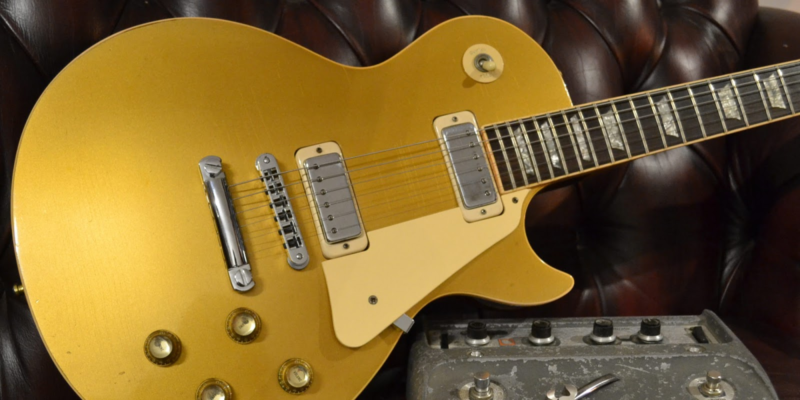Every great guitarist out there has their very own unique guitar tone. You can tell if it’s your favorite guitarist playing by listening to a great lick or solo. It’s like a person’s voice, just on an instrument. You might be thinking of Yngwie’s iconic arpeggios or of Hendrix’s funky wah-powered playing; you know it too well.
Having a special voice on the guitar though, often seems to be reserved only for the greatest. However, developing your own sound is far from impossible. In fact, you might just be very close to unlocking and embracing it. So how do you do that? Here are some tips to help push you towards that goal.
Don’t overthink it
Keep it simple: you just need a guitar, amp, and one or two stompboxes to create your sound. If you’re still in the early phase of discovering your sound, I strongly suggest to start playing on an acoustic guitar rather than electric. This way you won’t get distracted.
It’s easy to think that equipment and effects are what make the legends sound like they do, but that couldn’t be further from the truth. Using certain effects and amp settings, helps in getting the guitar sound that you like, but there are also other factors. Technique, rhythm, and influences all help shape a sound that is consistent on different setups.
Play with your amp settings and make do with whatever guitar effects you have. A good, suitable tone is central to a good sound. However, it’s your personal flair and style that help you create unique guitar tones.
Famously, Angus Young is a fan of plugging straight into his Marshall amps, yet you can always tell AC/DC music from any other band. So go work with what you have, it’s enough. The limitation you get in equipment might be the catalyst to get your unique guitar tone.
Listen to all kinds of music
You won’t ever get the full spectrum of guitar sounds if you listen to the same kind of music over and over. A good way to explore your sound is to branch out and listen to music outside of your comfort zone. If you’re a jazz person, listen to metal. If you’re a rock sort of guy/gal, check out electronic music.
After listening to interviews and podcasts, you’ll find that the majority of great musicians have a non-discriminatory taste in music. Every new piece is an entirely new set of experiences and techniques to steal; the weirder the better. The fast and heavy Judas Priest covered a song by Joan Baez, let that sink in.
A good way of discovering new music is by listening to the same music that your favorite guitarists listen to. Another way is to get recommendations from the friends you would not trust your car stereo to. That way you’d get inspiration from where you would absolutely never look. A more traditional method to discover new music is simply to turn on your radio and listen to stations you would normally stay clear from.
Don’t imitate
Imitation might be the sincerest form of flattery, but you aren’t going to get anything original out of it. It’s easy for a beginner to fall into the rabbit hole of following a certain guitarist’s habits to a tee. That could be a fun exercise, but if you aren’t careful it could be what’s keeping you from developing your own sound.
Instead of simply copying what you like, experiment! Mix and match several sounds; no one thought mixing 90s kids show jingles with Slayer would be a good idea, but here we are looking at how popular Babymetal is. Jokes aside, you never know what would sound good until you hear it. So, be original and don’t be scared to stray from the sounds of your inspirations.
Jam with a lot of musicians
Finally, try to play along with others as much as you can. Maybe it’s a small gig or just a noisy improv session with a friend. Often you won’t even notice you have a unique sound, but others will. Dream Theater’s John Petrucci once said in an interview that he didn’t think he had a unique sound and that it just organically grew out of him. Other people can better listen to and tell you about your own style of playing than you can. It feels great to hear someone just casually comment about how you sound.
Besides, in the same spirit of widening your horizons and taking in as many ideas as possible, playing with people exposes you to their unique ideas and different takes on ideas you have. Not to mention, the interaction between the musicians is likely to produce something greater than the sum of the individual parts. It’s no big surprise that the music of The Beatles sounds completely different from the music of either John Lennon or Paul McCartney as solo artists.
If you’ve got no one to jam with, there are a lot of ways you can meet and team up with other musicians. Look up local communities where you’ll find many who’ll be more than happy to join you (no matter your skill level). Websites like meetup.com will list local communities of similar-minded people. Local rehearsal and jamming rooms are also hotspots for people looking for musicians to have a bit of fun.
The biggest takeaways here are:
1) Start working on it, you will only get your own sound if you practice.
2) Don’t get stuck in a rut, explore and get as many experiences and ideas as you possibly can.
Whether you hope to achieve your sound with immaculate technical playing, a soulful melodic feel, or a unique effect-heavy vibe, it’s important to remember that every guitarist in history that had a unique sound of their own, started off just like you. So go out there and find a sound that you’re happy with. Never mind all the weird noises you’ll make at first, you WILL get there.

